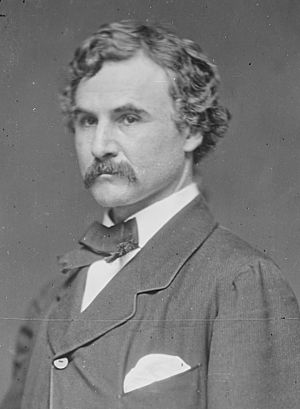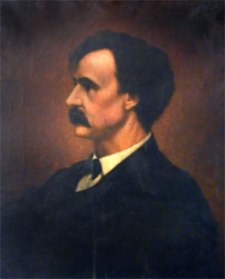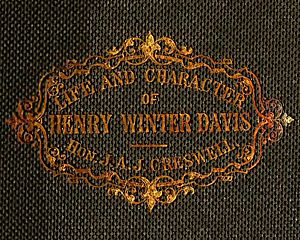Henry Winter Davis facts for kids
Quick facts for kids
Henry Winter Davis
|
|
|---|---|

c. 1860–1865
|
|
| Member of the U.S. House of Representatives from Maryland's 3rd district |
|
| In office March 4, 1863 – March 3, 1865 |
|
| Preceded by | Cornelius Lawrence Ludlow Leary |
| Succeeded by | Charles Edward Phelps |
| Member of the U.S. House of Representatives from Maryland's 4th district |
|
| In office March 4, 1855 – March 3, 1861 |
|
| Preceded by | William Thomas Hamilton |
| Succeeded by | Henry May |
| Personal details | |
| Born | August 16, 1817 Annapolis, Maryland, U.S. |
| Died | December 30, 1865 (aged 48) Baltimore, Maryland, U.S. |
| Political party | Whig (before 1855) Know Nothing (1855–61) Republican (1861–65) |
| Other political affiliations |
Unconditional Union (1863–65) |
| Alma mater | Kenyon College University of Virginia |
| Signature | |
Henry Winter Davis (August 16, 1817 – December 30, 1865) was an important American politician from Maryland. He served in the United States House of Representatives during the American Civil War. Davis was known as a leading member of the Radical Republicans. This group strongly opposed slavery and wanted big changes after the war. He played a key role in ending slavery in Maryland in 1864.
Contents
Early Life and Education
Henry Winter Davis was born in Annapolis, Maryland, on August 16, 1817. His father, Reverend Henry Lyon Davis, was a well-known Episcopal clergyman. His father also served as president of St. John's College in Annapolis.
Henry Winter Davis went to Kenyon College in Gambier, Ohio, and graduated in 1837. He then studied law at the University of Virginia School of Law and finished in 1841. He started his law career in Alexandria, Virginia. In 1850, he moved to Baltimore, Maryland, where he became a respected lawyer.
Davis also wrote a political book in 1853 called The War of Ormuzd and Ahriman in the Nineteenth Century. In this book, he suggested that the United States and the Russian Empire would become major rivals. He also strongly disagreed with the idea that slavery was a good or right thing.
Political Career in Congress
Even though his family had owned enslaved people, Henry Winter Davis strongly opposed slavery. He began his political life with the Whig Party. When the Whig Party broke apart, he joined the Know Nothing movement. He served in the House of Representatives from 1855 to 1861 as a member of the American Party, which was influenced by the Know Nothings. During this time, he expressed concerns about the influence of foreign-born citizens in elections.
In 1859, during a vote for the Speaker of the House, Davis voted with the Republicans. Because of this, the Maryland Legislature criticized him and asked him to resign.
In the 1860 presidential election, Davis was not yet a Republican. He chose not to run for Vice President for the Republican Party. Instead, he supported the Constitutional Union candidates, John Bell and Edward Everett. He lost his bid for re-election to Congress that year.
Between the time some Southern states left the Union and the start of the Civil War, Davis worked on ideas to find a compromise.
Becoming a Radical Republican
After Abraham Lincoln was elected and the Civil War began, Henry Winter Davis became a Republican. He was re-elected to the U.S. House of Representatives in 1862. He quickly became a strong and outspoken Radical Republican. This was seen as surprising because Maryland was a border state that still allowed slavery.
From December 1863 to March 1865, Davis led the Committee on Foreign Affairs. In 1864, he was concerned about France's actions in Mexico. He presented a report that was very critical of France. The House of Representatives approved it, but the Senate did not.
Davis and other Radical Republicans strongly disagreed with President Lincoln's plan for Reconstruction. This was the plan to rebuild the Southern states after the war. Davis thought Lincoln's plan was too easy on the former Confederate states.
On February 15, 1864, Davis introduced a bill known as the Wade–Davis Bill. This bill, named after Davis and Senator Benjamin Wade, aimed to put Congress in charge of Reconstruction. It stated that Southern states could only rejoin the Union if they:
- Took away voting rights from important Confederate officers.
- Ended slavery completely.
- Refused to pay any debts from the Confederate government.
Davis argued that until Congress approved a new government in the rebel states, only Congress had authority there. This bill was the first time Congress formally stated its ideas for Reconstruction. It passed both houses of Congress on July 2, 1864.
However, President Lincoln did not sign the bill, so it did not become law. On July 8, Lincoln issued his own statement about his Reconstruction plans. Soon after, on August 4, 1864, Davis and Senator Benjamin Wade wrote a public letter. They strongly criticized President Lincoln for overstepping his power. They suggested that Lincoln's plan might not fully end slavery in the rebuilt states.
Later, in a debate in Congress, Davis said that when he first joined Congress, the government followed laws. He felt that by then, it had become a government based on one person's decisions. He was one of the Radical leaders who preferred John C. Frémont over Lincoln in the 1864 election. However, he later changed his mind and supported Lincoln for re-election.
Davis joined the Unconditional Union Party. He was an early supporter of allowing African-Americans to join the army. In July 1865, he publicly supported giving African-Americans the right to vote. He did not run for re-election to Congress in 1864. President Lincoln noted that Davis had been very critical of him, but hoped he would focus on his own interests.
Henry Winter Davis passed away in Baltimore on December 30, 1865. He was buried in Greenmount Cemetery.
Henry W. Davis was a cousin of David Davis, who was a Supreme Court Justice and later a U.S. Senator.
See also
- Anna Ella Carroll
- James Morrison Harris
- Thomas Holliday Hicks
- Henry William Hoffman
- Anthony Kennedy
- John Pendleton Kennedy
- Cornelius Leary
- Plug Uglies
- James Barroll Ricaud
- Rip Raps
- Edwin Hanson Webster
 | Emma Amos |
 | Edward Mitchell Bannister |
 | Larry D. Alexander |
 | Ernie Barnes |



